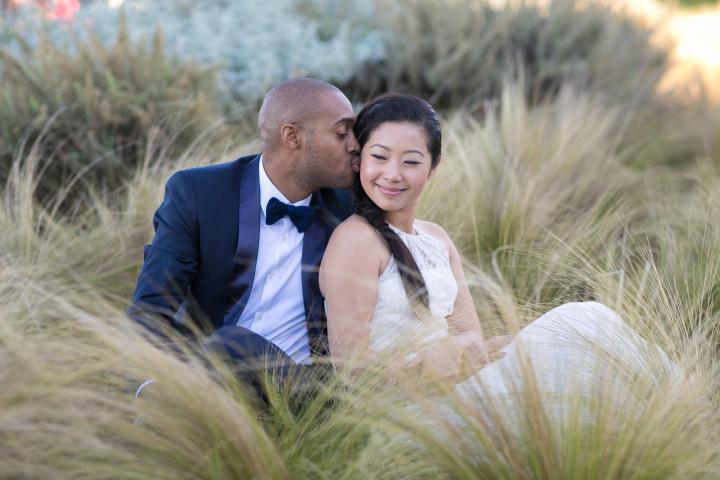7 Stages of Marriage That Are Totally Normal
Here, couples counselors share the stages you can expect your relationship to weave in and out of—and how you can ride the tides towards marital bliss.


Photo: Black & Hue Photography
When you first met your partner, you likely thought he or she could do no wrong. Everything from the way they cock their head to the side upon learning something new to the little snort they make when they’re in a fit of laughter is downright adorable. If you’re still in this relationship phase, enjoy every little moment of it, because chances are, it won’t last.
That’s not to sound pessimistic in any way, it’s just that the stuff of real relationships is not what you see in the movies. In other words, there will be ups and downs and there won’t always be happy endings at every turn. But don’t worry—this is a good thing! Quality relationships cannot sustain themselves on butterflies and sweet-nothings alone.
“Many very successful couples have never had ‘just like the movies’ love affairs, and this can leave them wondering if they got married for the right reasons when the later stages of the marriage arise,” explains Kathy McMahon, Psy.D. clinical psychologist and President of Couples Therapy Inc. “So if you are in this stage, enjoy it, but if not, worry not: Your friendship can still create a lasting and close bond.”
All long-term relationships go through phases that need work or time to get through. Finding yourself in a funk? Totally normal. This too shall pass, as they say.
Stage One: The Honeymoon
This is the phase we first mentioned—the one where your partner couldn’t get any cooler, or more attractive, or smarter...and the list goes on. For some couples, this phase may last six months and for others it may stretch as long as two to three years. “That first rush of romance, also called limerence, when the other person seems utterly attractive in every way, and any small complaints you might later have (he twirls straw wrappers, she feeds your dog too many treats when you’re not looking, he leaves dirty dishes next to the bed, etc.) temporarily fade into the background and seem totally unimportant,” says Julienne Derichs, licensed clinical social worker in Chicago.
You might experience this phase twice—when you first meet and again after the wedding. “When you’re just getting used to saying ‘my husband’ and it sounds super weird and cool at the same time, you’ve landed back in the honeymoon phase,” says certified life and relationship coach, Sophia V. Antoine. “There really isn’t must to ‘get through’ in this phase. It’s pretty amazing.”

Photo: Ashley Paige Photography
Stage Two: The Reality Check
The honeymoon has officially ended and every single thing he does or says is no longer adorable—in fact, it’s getting on your nerves. Familiar date night spots might feel like reruns of Seinfeld, but the spark is still there, you just have to find new ways of reinventing it. In this phase, Antoine notes, you realize that you are married—for real. Your life—both individual and the one you share together—start becoming more routine and predictable than you originally realized before you said “I do.” “This is when couples experience the wake up call that marriage is not just fun and games—it’s a lot of work,” she explains. “You might ask yourself questions like: Why did I get married to him again? Did he chew with his mouth open when we were dating? He doesn’t really think I am wearing lingerie to bed every night, does he? You want me to try what?” How do you survive this semi-abrupt phase in your marriage? With open and honest communication, Antoine says. “Keep in mind that it’s new to you both.”
Stage Three: Managing Differences
When all you could see were the ways in which you and your partner were similar, and all of the ideas and beliefs that you agreed on, things were easier. Now, you’re realizing that your partner is, indeed, different and his or her own person. In order for the relationship to continue, McMahon says it’s important to manage this disillusionment with grace. “Many couples don't have the first clue how to fight well and negotiate, so they either battle endlessly or try to cover up these differences in an attempt to minimize them,” she says. Neither is an effective strategy. “The awareness of difference is best handled in an accepting way.” While being “madly in love” was an easier phase in your relationship to get through, the phase in which you iron out your differences and learn to embrace your individuality is not only inevitable, but McMahon says it’s necessary.
Stage Four: I Could Get Used to This
This phase is usually after a few years of marriage, once you’ve made peace with the routine and kind of like it. You might be ready to make big moves in your life together—a life that no longer feels “new.” You may be considering purchasing a new home, thinking about having a child, or considering moving across the country, says Antoine. “If you do wind up having children, you’ll soon find yourselves happily raising them and adulting on a whole new level.”
All of a sudden the tiny ups and downs that felt so dynamic have become more stagnant. “Couples learn what issues to let go of and what issues to get into and fights tend to decrease because we are more easily able to put ourselves in our partner’s shoes and see them with kindness, empathy and compassion,” explains Derichs. “You still might not agree on everything (like you did when you first fell in love) but that's okay.”

Photo: Ben Elsass Photography
Stage Five: Do You Remember When?
In this phase, most of your story has already begun to unfold—and it’s done so beautifully. The two of you can look back and see how far you’ve come as a couple, which strengthens your bond and reaffirms your love and commitment to each other. “At this stage, the hands on the accordion begin to move closer together,” says McMahon. “With a clearer sense of self-esteem and personal identity, the couple begins to reconnect with a greater sense of ‘we-hood.’”
There is also much more peace and unity in your relationship. “You value your partner's sense of commitment to making your marriage last, and you often feel more secure about yourself as a person,” explains Derichs. “Learning to appreciate the differences between you and your spouse is a conscious ongoing priority and what you don't love about your spouse you learn to accept.”
Stage Six: In Sickness and in Health
When you think about the older couples you know—perhaps your parents or grandparents—you can see how common it is for one spouse to become ill or have a health scare as you age. These are difficult times to deal with, but this phase is an important one to prepare for, explains Antoine. “This may mean sitting down with a lawyer or insurance agent to get everything in order,” she says. “You also want a financial planner to take care of finances.” This is also a phase where love is tested the most. “This isn’t talked about or glorified like the others, but it is a very real part of married life.”
Stage Seven: The Golden Years
In this final stage, a couple usually experiences the most stability—perhaps the children have emptied out of the nest, gone to college and even started families of their own. As Antoine says, you have to reverse engineer this part of marriage. “In this phase you may move to your final home where you plan to live out the rest of your days, you are really comfortable with each other and you just want to enjoy the fruits of your labor.” And enjoy you shall!





